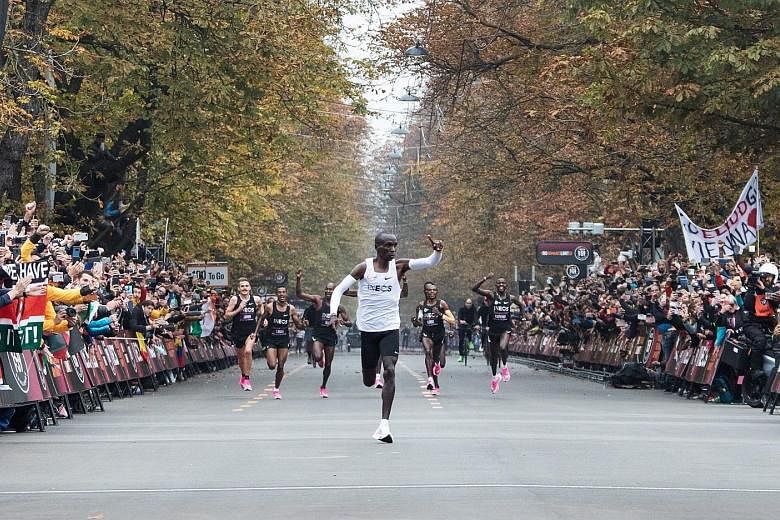VIENNA • Eliud Kipchoge became the first person to run a marathon in under two hours yesterday and, in doing so, stretched the limits of human endeavour and passed a milestone few thought could be reached for decades, if at all.
On a misty morning in Vienna, on a course specially chosen for speed, guided by green laser beams shone onto the road and helped by 41 elite athletes acting as rotating teams of pacemakers, the Olympic champion and world record holder smashed the barrier by 20 seconds, finishing in a once-inconceivable time of 1hr 59min 40sec.
It was regarded as the biggest achievement in athletics since Briton Roger Bannister broke the four-minute mile in 1954 and was likened by Kipchoge himself to a superhuman experience.
"Today we went to the moon and came back to earth. I am at a loss for words for all the support I have received from all over the world," said Kipchoge, 34, his country's Kenya flag draped over his shoulders.
"I am the happiest man to run under two hours to inspire people, to tell them that no human being is limited. You can do it."
However, his feat was not recognised as a world record by the sport's governing body, the International Association of Athletics Federations, as it was not in open competition and used 41 pacers, including Olympic 1,500m champion Matthew Centrowitz and former 1,500m and 5,000m world champion Bernard Lagat.
As the pacemakers peeled away for the last kilometre, Kipchoge, still barely sweating, accelerated down the final straight. He smiled, pointed to and waved at the adoring galleries, 15 deep in the middle of Prater Park which drew a crowd of about 20,000, as he galloped towards athletic immortality.
-
HOW FAST WOULD HIS 2.4KM TIME BE?
-
6min 48.39sec
Crossing the end, he threw his arms around his wife Grace, who was watching him race live for the first time, then let a throng of supporters hoist him into the air.
The soft-spoken Kipchoge, who leads a monastic existence at a spartan running camp in Kenya's Rift Valley and is nicknamed the "philosopher" for his love of reading, described the period between a 4.50am wake-up call and his scheduled 8.15am start as the toughest of his life. What followed resembled blissful simplicity.
"I was really calm and trying to go with the pace, not to be crazy or slow, but to follow instructions and what the pacemakers are doing," he said, adding that the achievement meant a lot to his homeland.
There was unbridled joy in Kenya as thousands celebrated on the streets. In Nairobi, traffic stopped as people gathered in bars and anywhere with TV screens as their hero closed in on the finish line. Kenya President Uhuru Kenyatta also tweeted his congratulations.
The challenge, backed by British petrochemical company Ineos and reportedly cost £15 million (S$26 million), was Kipchoge's second attempt to break the barrier, having missed out by 25 seconds in Monza two years ago.
The 9.6km course (Kipchoge did four laps) in the Austrian capital, which was entirely flat and 90 per cent straight with two loops at the end, was designed with slightly steeped banks and had been partially resurfaced to help Kipchoge, wearing prototype running shoes, keep pace and avoid injury.
The venue and time were carefully chosen by organisers and meteorologists to provide the best-possible conditions - cool and windless - although it was slightly more humid than expected and there were a few spots of rain.
The pacemakers, running in stints of 4.8km, kept him on the right side of the clock. Throughout the run, Kipchoge, who set the world record of 2:01:39 last year at the Berlin Marathon, ran at a remarkably steady pace which varied between 2.48 and 2.52 minutes per kilometre and was consistently around 10 seconds under the target.
His coach Patrick Sang, an Olympic runner-up in the 3,000m steeplechase in 1992, paid tribute to Kipchoge: "Everything went perfectly. Records are meant to be broken, I'm sure someone down the road will want to try to break this one, but history has been made." It was his way of saying marathon running will never be the same again.
REUTERS, AGENCE FRANCE-PRESSE


